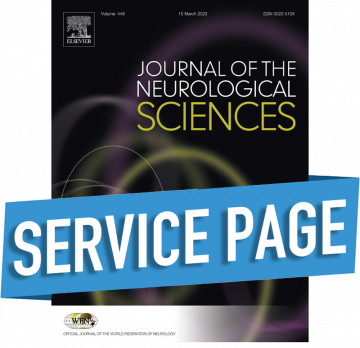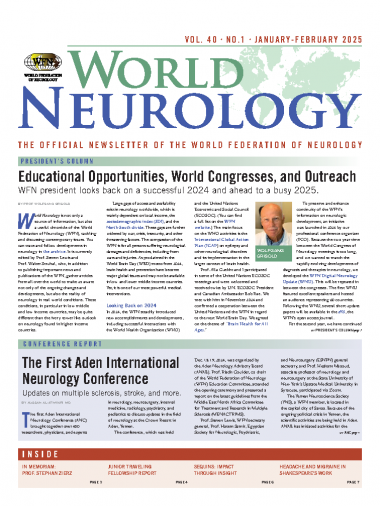WFN Publications
Jump to section
WFN Journals
|
||
World Neurology
To keep neurologists across the world informed about what their colleagues in other countries are doing, our bi-monthly newsletter, World Neurology, is posted on the WFN website, and mailed on request to almost 30,000 individual specialists belonging to our member societies.
The Journal of the Neurological Sciences
The Journal of the Neurological Sciences is the official journal of the World Federation of Neurology.
The journal provides a medium for the prompt publication of original articles in neurology and neuroscience from around the world.
JNS places special emphasis on articles that:
- provide guidance to clinicians around the world (Best Practices, Global Neurology);
- report cutting-edge science related to neurology (Basic and Translational Sciences);
- educate readers about relevant and practical clinical outcomes in neurology (Outcomes Research); and
- summarize or editorialize the current state of the literature (Reviews, Commentaries, and Editorials).
 JNS Service Page
JNS Service Page
The WFN Service Page of the JNS is an editorial section aimed at informing and increasing the awareness of the WFN activities in several aspects, in particular with regard to education, the global activities with the WHO and UN ECOSOC, and the projects of the WFN.
eNeurologicalSci (eNS)
eNeurologicalSci is the official open access journal of WFN.
eNS accepts most types of manuscripts for consideration including original research papers, short communications, reviews, book reviews, letters to the Editor, opinions and editorials.
Topics considered will be from neurology-related fields that are of interest to practicing physicians around the world. Examples include neuromuscular diseases, demyelination, atrophies, dementia, neoplasms, infections, epilepsies, disturbances of consciousness, stroke and cerebral circulation, growth and development, plasticity and intermediary metabolism.
The fields covered may include neuroanatomy, neurochemistry, neuroendocrinology, neuroepidemiology, neurogenetics, neuroimmunology, neuroophthalmology, neuropathology, neuropharmacology, neurophysiology, neuropsychology, neuroradiology, neurosurgery, neurooncology, neurotoxicology, restorative neurology, and tropical neurology.
















